#dune meta
Explore tagged Tumblr posts
Text
regarding Dune Part 2: i am obsessed with its consistent visual theme of self-destruction. the shot of paul surrounded by his new followers seems triumphant - until the viewer remembers that each crysknife is made from a tooth of shai-hulud, and paul is standing in a circle of them, in the allegorical mouth of the worm. he orders a missile strike, and the viewer sees them fly directly through his head. every victory for the prophecy is a blow to paul himself; he's killing himself with every step he takes towards his destiny, and we know that already, and the film is screaming it, but it's a hell of a thing to watch it happen, isn't it?..
#dune#dune part 2#dune 2024#paul atreides#kwisatz haderach#shai hulud#dune 2#dune meta#film analysis#visual metaphors
6K notes
·
View notes
Text
dune really explores every possible way someone can die without actually dying. paul's childhood self dies the night his father does. his atreides heritage dies when he seeks revenge. paul himself dies when he drinks the water of life. jessica the wife dies the night leto does. jessica the mother dies when she drinks the water of life. the girl alia could have become dies in the womb. stilgar dies when he becomes a follower. the fremen die when they leave their home to fight paul's war for him. the narrative treats every one of these deaths as a tragedy, as a palpable loss; the ghosts of who these characters were or could have been remain to haunt the narrative long afterwards.
(expanding on my original tags from this post)
#dune#dune meta#meta#dune series#dune movie#dune 1#dune part 1#dune part one#dune 2021#dune 2#dune 2024#dune part 2#dune part two#paul atreides#paul#leto atreides#leto#jessica atreides#jessica#lady jessica#alia atreides#alia#stilgar#fremen#water of life
1K notes
·
View notes
Text
Paul, looking out in horror at the Harkonnens massacring Sietch Tabr, saying "I didn't see this coming" (I should've/could've seen this coming). Paul, having a vision of Chani dead in his arms. Paul, having a vision of a djinn Jamis telling him to drink the Water of Life so he can see the future. Paul, after months of being terrified of what the prophecy will do to him, willingly going into it so he can See. So he will be able to See the future and protect the people he loves. Paul, succumbing himself to monstrosity, in the end.
Paul, watching Chani walk away.
#oh god. oh fuck.#in the end his mom didnt convince him to come to the south#his fear did#that there would be more attacks that he couldnt foresee and more fremen would die. Chani would die.#im sobbing on the floor#dune part two#dune 2#dune meta#paul atreides#chani#chani kynes#paul x chani#denis villeneuve#lisan al gaib#kwisatz haderach#dune 2024#dune part 2#dune part two meta#dune chani#paulchani
1K notes
·
View notes
Text
I can't stop staring at Feyd-Rautha's walk here and what it implies about his fight with Paul now that I'm able to stop just comparing it to Timothy's killer body work matching it (or vice versa).
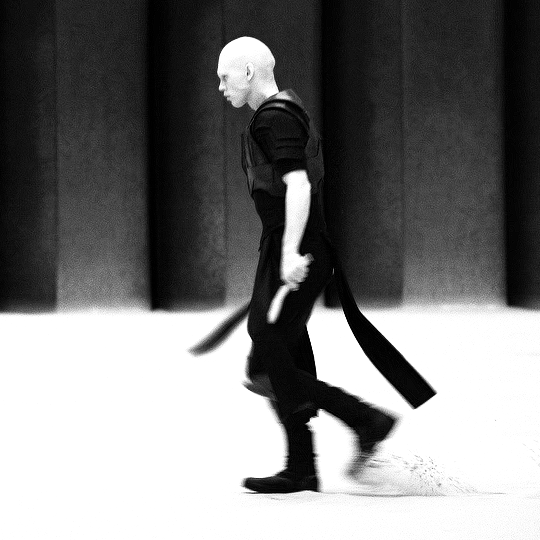
Villeneuve takes the book canon, that the Harkonnens took the Atredies's morbid heirlooms of an oil painting of grandfather's death and the bull's head with his blood still dried on his horns to hang above the arena as trophies to the next level: making Feyd-Rautha the victorious young matador with the guards dressed as bull-minotaurs, circling to play banderillos and sink banderillas into the backs of the Atredies bull if it gets too close before the final faena has Feyd-Rautha pulling his opponent past him in the close, intimate passes that show off his athleticism and skill before his false blade is exchanged for the one that will be used for the killing blow and oh my god there are whole schools of thought on coming forward to meet your opponent vs waiting for them and killing with a single blow to the heart and honoring the fight and if anyone who knows how to make gifsets wants make one about this to I'd LOVE to rant more about the breakdown of these two fights and how Feyd is 1001% Matador Machismo but my point to all of this is:
Look at that Sand.
Look at his feet dig deep and kick it up as he strides out into the heart of that arena. Is it a rhythmic walk? Oh yes. Confident. Powerful. In the book this will be his 100th arena kill as he comes of age. This is his natural habitat. Where he learned his skills, for us to parallel with what we saw for Paul in Part 1.
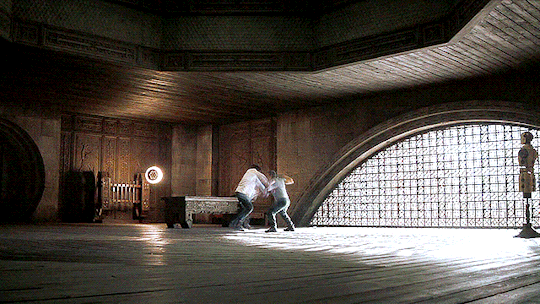
This matters, because it's one of the main premises for why the Fremen are so Good At Fighting. When everyone is trained to fight with shields (stun then slow) and bulky armor, and on flat, solid ground with lots of cover, it's easy to be fast and silent and terrifyingly effective against them. Gurney Halleck is shown to be one of the best fighters in the franchise and the film makes a point of showing how his (recognizable) footsteps are not suited to move quickly, lightly, and with stability on sand like they are on solid ground.
Only... Bullfighting rings aren't sandy. They're fairly hardpacked. Earth for the bull and Matador to maneuver in quickly. There is a layer of albero traditionally layered on top, a chunky yellow clay dirt that serves aesthetics but also absorbs blood quickly. The idea the sand may not be white because... With Giedi Prime who knows?! Is Fantastic.

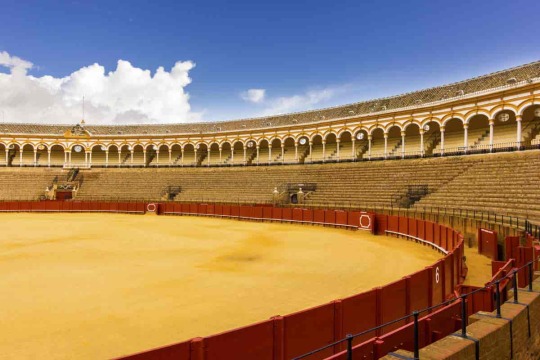
Paul Muad'Dib became the only Atredies to be recognized as Fremen, to see his father's dream of Desert Power recognized, to fight as Fedaykin, to be recognized as the Mahdi, the One Who Points The Way, and it is made clear to us from the opening words of a Child's History of Muad'Dib that Arrakis was his Home, and yet every major one-on-one duel he had from Jamis to Feyd-Rautha was on solid ground, giving him an advantage that made him respected as a fighter among the Fedaykin right away as part of his training.
Feyd-Rautha was the one Harkonnen who may have learned combat primarily or even exclusively with sand beneath his feet, and he died on Arrakis on the polished stone floors of a palatial residence, still trying to play by Matador rules.

thank u for coming to my Ted Talk
#dune meta#feyd rautha harkonnen#paul atreides#dune part 2#burn after scrolling#dune#dune 2024#feyd rautha#house harkonnen#feydpaul#duneposting
1K notes
·
View notes
Text
Some thoughts on Dune, media literacy and the way we interact (and do not interact) with difficult topics in fiction....
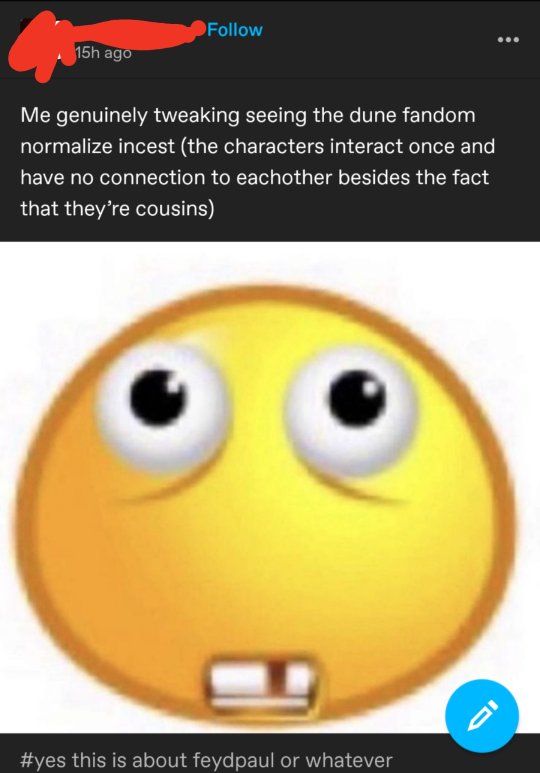
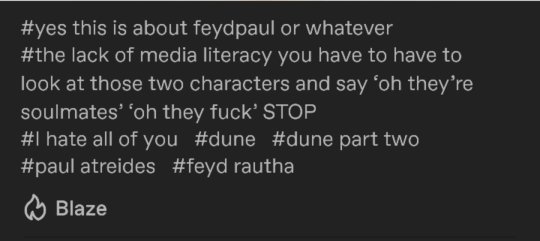
Buddy, imma say this with kindness in my heart.... If this gets you 'tweaking' then you aren't gonna like the ending of Children of Dune...
On the media literacy note.... big sigh.
It is explicitly said that Feyd and Paul were meant to marry and have a child had Paul been born a girl - obviously the natural reaction is to consider what the nature/implications of that would have been. The source material is EXPLICITLY telling you that they were made for eachother, destined to be together. This is also the text EXPLICITLY telling you that this relationship would be an acceptable thing in this world. Therefore engaging with this concept is not at all a reach and is very much backed up by the source material. People are not getting this idea from nowhere.
(Also if that still offends you, they're not actually first cousins but cousins once removed and 2 seconds of thinking about the family tree would have made that obvious, not that it really matters at all in the context of this story, but it is a very easy feat of inductive reasoning)
The fact is that this is a story about ruling families and (as they almost always do) it involves a degree of incest. This is ESPECIALLY true in the world of Dune where these people are being selectively bred like show dogs to have certain genetic characteristics, I hope I do not have to patronise anyone by explaining how that works. Especially given as Reverend Mother Mohiam says this, oh, 10 pages into the first book:

People who haven't read the literature love to lecture people on literacy, funny.
So, in conclusion, if this is how you feel then, with love, Dune is not the story for you. The fact is that a degree of incest IS normalised in this universe and if you're inclined toward tedious moralising based on writers exploring difficult ideas in fiction then I'm honestly surprised you ended up here in the first place. Dune is a story that constantly presents the reader with difficult ideas and invites them to critique and analyse them for themselves, including the morality of the Bene Gesserit breeding programme. In Dune no character is morally pure, no ideology is beyond corruption and no path is free of ugly choices. As adults we can engage with these difficult topics as we wish.
*Sigh* A few years ago these people learned the term 'media literacy' and they've been insufferable ever since.
#dune#paul atreides#feyd rautha#dune part 2#dune part two#timothée chalamet#austin butler#dune meta#feydpaul#dune spoilers#paulalia#tw incest#incest cw
898 notes
·
View notes
Text
just rewatched Dune Part 2 and noticed something, when Feyd Rautha enters the area for his birthday fight, and after he wins the fight, the people in the audience of the arena are chanting his name in a very rhythmic and quite frankly terrifying way - "Feyd Rau-tha! Feyd Rau-tha! Feyd Rau-tha!"
And after Paul kills Feyd Rautha, takes Irulan's hand in marriage, and declares war on the great houses, the Fremen people around Paul begin to chant - "Lisan al Gaib! Lisan al Gaib! Lisan al Gaib!"
They chant for Paul with the same rhythm and ferocity with which the Harkonnen audience chanted for Feyd Rautha earlier in the movie. If that doesn't show Paul's transformation and loss of humanity then idk what does
(also FeydPaul parallels in general yessssss I love every connection between these two fucked up boys, it's tragic that they barely even get ten minutes of screentime together)
#if this is incomprehensible it's because I'm barely awake falling asleep as I write it#sorry but not sorry bc i just really needed to get my thoughts out#dune part 2#dune#paul atreides x feyd rautha#paul muad'dib#paulfeyd#paul atreides#feydpaul#feyd rautha#feyd rautha harkonnen#dune 2#dune meta#dune analysis
646 notes
·
View notes
Text
Now, let's talk about "you fought well, Atreides".

Yes, Feyd-Rautha enjoys the fight. He enjoys the volence. But he is acutely aware of the fact that he is on the Arena. He's a gladiator - Baron put him here for his own entertainment. On a gladiator's arena, one might be a beast, and another one might be a warrior, but both of them face death; the game is rigged to Feyd-Rautha win, but he still could've died.
This gives us a look into Feyd-Rautha's particular kind of madness: he's cruel, he enjoys the acts of violence, but he's not arrogant to assume he'll always land on top. He understands the hierarchy of power very well. It is shown in his behavior in the Emperor's court: he doesn't get himself involved into a battle he can't win, just observes.
And we know who taught him well.
At the Arena, he shares a short, perverted moment of tenderness with his victim - because it could've been him. The fight was rigged against them both: of course Baron expected him to win like this, without a shield, because Feyd-Rautha was put into the Arena in front of millions of his fanatics. When gift is not a gift?
Nothing about this is honorable. You didn't stand a chance, but you fought well, Atreides.
But the second time we hear this, everything changed.

Baron is dead. For a fleeting moment, Feyd-Rautha is Baron. There is no game within a game. Nobody forces him to step up as a champion. The goal is clear - protect the emperor. Neither fremen or sardaucar will interrupt them.
Finally, he can have his honorable and true fight.
He doesn't kill Paul, while he lays on the floor, because that move would be almost constdered a sucker punch.
And Paul wins the right way. It could've been either of them, but now it's Feyd's choice.
"You fought well, Arteides", and I am grateful for that.
I wonder if Paul catches this gratitude.
#dune#dune part two#feyd rautha#feyd x paul#feydpaul#paul atreides#dune meta#almost a headcanon tbh but whatever
784 notes
·
View notes
Text
Feyd thoughts from Fenring scene
I was sharing thoughts to a friend while rewatching the Feyd and Fenring scene and figured I'd share it here too, it's my blog innit.
He's walking on his own in a completely empty corridor. Upon being followed he ambushes and pulls a knife, meaning he immediately assumes he's in danger. Calm and collected attitude at this prospect, clearly not his first time.
But he also doesn't toy with her, doesn't threaten her beyond asking about her presence, he's not showing any sadistic traits.
He openly asks if they've met because he recognises her, isn't being coy.
Instead of being violent, he tells her the rules: 'You're not allowed in this section', meaning at least he knows not to be openly hostile to guests.
He's suspicious she got past the guards. He asks about that in a higher pitch, but extremely bland face. He doesn't sound upset or happy or angry. More like low key worried.
From there Margot uses the voice.
She reveals he's shunning his own celebrations, AND he refuses to say why despite being asked with suggestive voice.
He immediately recognises the use of the voice on him and calls her a Bene Gesserit. How? He doesn't answer when she asks what makes him say that. We have to keep in mind that his mother (who he killed) was BG, and since we don't know when she died, it's possible he received some training from her.
He instead says he dreamt about Margot, harkening back to Chani dreams from Paul. Meaning we can safely assume he's just as plagued with semi-visions as Paul was in Dune 1 before going to Arrakis, and we can safely assume that's not common knowledge.
Immediately goes 'Don't mock me woman' when she teases him. BUT crucially, she says "a pleasant dream I hope?" which is not mockery but closer to flirting? It's like he genuinely takes that as a literal tease, when the actual teasing is when she says "I wouldn't dare!" which he doesn't comment on, maybe because he's used to many forms of grovelling.
He also reacts as if the voice is a physical pressure, like when you come down on a plane and your ears get blocked, and tries to shake it off:
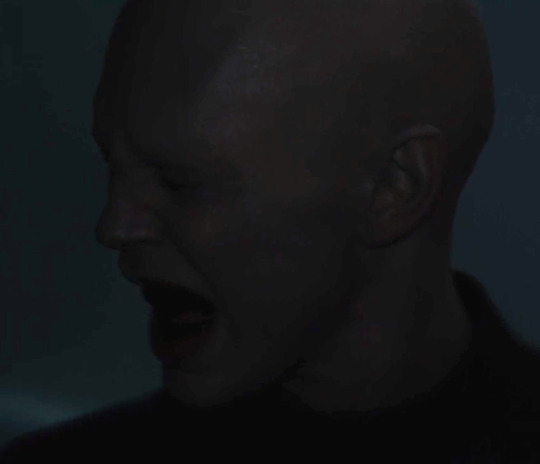
Again with 'I know your BG tricks'
Margot asks, again, and gets no reply, again. She even says "tell me" in a normal voice. There is no cut or weird editing afterwards, so we can assume that Feyd didn't answer either time he was asked.
Instead he takes his bearing and looks around. He is not aggressive or panicked when he admits to not recognising the place.
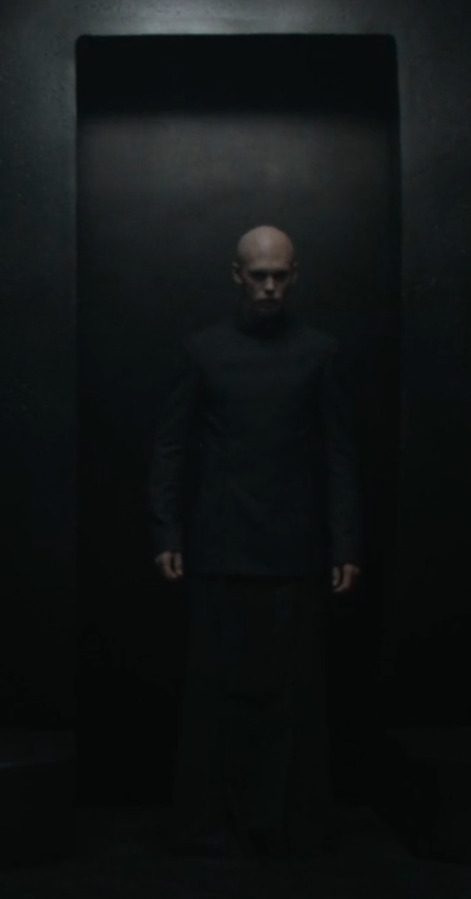
Dude is designed to blend into his surroundings. Bonkers he doesn't wear gloves at this stage.
Risk taking : he steps unprompted in the door entrance, and she then says "come to me, kneel," etc. BUT we know he KNOWS about the BG tricks, so we can suppose that he's actually making the decision to go in despite knowing full well she can and will control him.
There's plenty of hints that he may still be heavily under her charm, but there's also evidence he can resist the voice she uses on him (he never answers her repeated questions, tries to fight it off).
He never reacts agressively. He says "where are you going?" with some heat when she leaves though, which to me hints at loneliness. He was all alone avoiding every harkonnen under the moon on his birthday despite being the king of the night, meets a random chick he dreamt about, and now she leaves? Spiced suggested though he may ask because he's not used to people leaving without being dismissed. But imo these can blend.
I lean towards Feyd being quite resistant to the voice because they sent Margot in the first place. Yes, Mohiam wants a child made, but in her excuses, she does't say "I want him bred". Instead she says she's a motherly figure and he might have killed her because he killed his mom. If the voice was such a perfect tool of control, that wouldn't really be an issue, especially once you have him under the Gom Jabar.
There may be an element of "These men [Paul and Feyd] are one generation away from the KH and can't be toyed with carelessly".
He also killed his BG mother, which means he's capable of killing a sister and not any small fry.
So they send a sexy woman to woo him and yet she still has to ask multiple times about what he knows of the BG.
Regarding his dreams, it's also possible Feyd is so compliant and keen to follow Margot because he might have foreseen a freaky good time with her.
One is left to wonder if he looks at Mwaddib walking into the throne room with such intensity not because he's hot for him (he doesn't yet know it's Paul), but because he may have SEEN this scene in dreams. We know Paul was very affected by the spice in the air and food on Arrakis. We also know he made frequent false visions (Jamis helps but it ends up being Chani. Chani and him cut ambiguously in the killing scene. Seeing himself in Chani's place in the final combat scene...) So we can also imagine Feyd may be overconfident in taking in the Emperor's challenge because he's dreamt of this too. Just spitballing.
The BG call him a sociopath with a side of hollywood competency. He has a bit of the BBC Sherlock and Hannibal Lecter disease. He should not be as tame or as competent as he's described and shown if he had the full disorder.
It's very interesting to look at the Fenring scene with sociopathic traits in mind and see how they apply or don't.
He's not getting his need for validation avoiding the party, but he just survived an attempt on his life by his Dear Uncle before getting his freedom dangled in front of him. Lots on his mind.
He's not prone to anger outburst in general. His behaviour isn't very erratic either. Both of these classic traits were probably curb-stomped by the need to fit the mold imposed by the Na-Baron position.
But he definitely has a high sense of his superiority and is opinionated. He speaks up unprompted during the Baron's interview, and again behind the Emperor with 'he's bluffing'
High propensity for violence: check. Whole film, basically. He can be prompted by anger (against Rabban), perceived threat (arena), reactive/defensive (against Margot trailing him). Violence in reaction to fear isn't shown.
Difficulty maintaining relationships : the only people he seems fond of are his once shown, once mentioned pets he brings with him. His family relationships are what they are, and he has no friend to go to on his Birthday.
Generally fearful, vulnerable to anxiety and rejection, easy to humiliate : what a cincher. This is him reacting defensively to Margot's flirting. The BG say fear of humiliation is one of his levers, and if you give him a strong attachment to an honour code, it's very easy to manipulate.
IMO this feeds into his displays of vanity (black teeth, tailor made pretty pets). Also since black is seen as a rich and beautiful colour on their world, his all black outfits with clean cuts may not be as muted as we think they are.
the end... for now.
#feyd rautha#feyd rautha harkonnen#house harkonnen#margot fenring#gom jabbar#dune 2#dune#dune meta#dune part two#dune part 2#paul atreides#character analysis#sociopathy#bene gesserit
358 notes
·
View notes
Text
I think that if Paul Atriedes had a single friend growing up he wouldn't have done all that.
#or a sibling#maybe if victor had lived things would have been different#but then Paul might not have been born so#paul atreides#dune#house atreides#dune meta
166 notes
·
View notes
Text

Leto. baby. you think you're melancholy. you never got to see your son and grandson rule the known universe and whine about it to their recycled Duncan Idahos
the thing is I love this passage in Dune, I love Leto's meltdown in front of Paul. it's sad and raw: we see Leto fall apart and see what it does to Paul. for a moment Leto's cynicism and fear come crashing down and Paul who is still a child, who still calls his father sir, has to keep it together for both of them. Leto can't help it, Arrakis is getting to him, the lack of sleep and constant danger and he needs Paul, he needs someone he can show weakness with even if Paul can't understand him yet: "I have to have someone I can say these things to, Son."
and then the moment passes and they head out to their spice mining trip with Kynes. and Leto is Leto again. we see him in action, a sharp diplomat, a strong leader, the ruler of Arrakis.
we see who he is at his strongest right after having seen him at his weakest.
Leto's arc in Dune is so short but there is so much there: that dinner scene where he weirds out all his guests...his quiet rage after the hunter-seeker attack on Paul...the lonely moments of him staring out into the desert dawn wondering if the world he has taken his son to will ever become a home..
there is a reason Villeneuve's Emperor calls him a weak man and has to pay for it. that line is not in the book but it should be.
there is weakness in Leto's strength. there is a tenderness and awkwardness neither his father nor his years as Duke have driven out of him.
we get little time with him but the time we get? some of the most beautiful parts of the book (and Villeneuve's Dune) are about Leto
146 notes
·
View notes
Text
Somehow I have made it this long without realizing that none of the screen adoptions of Dune so much as mention the Butlerian Jihad. Like I guess it's burned into my brain so hard I sort of assumed it was part and parcel of the universe. Don't get me wrong, I think that's probably the first thing you learn if you want to dive deeper into the setting, but it still hits me like if the LotR movies showed us the big flaming eyeball tower and was like ‘Oh, that's why there are bad things, but don't worry, that's just background stuff.’ Yeah, you can understand the movie, but if the story is just like Frodo vs. The Witch King you are losing out on any of the conversation about the corruptive allure of power or theological undertones. So without further ado let's pretend this is for the benefit of interested new fans roped in by the movies and not part of my desperate attempt to silence the howling specters of literary analysis that live in my blood.
The Butlerian Jihad is an event set ~10k years prior to the events of Dune in which humanity won their freedom from the machines that they had enslaved themselves to. As a result, it is a religious taboo to create a machine that thinks like a human. That's frankly the bulk of the information presented by Frank Herbert in the text without dipping into books 7+, but whether or not those are canon is frankly an enormous can of worms, which really makes sense when you consider the size of the worms. But boy howdy, Frank loved his subtext and parallelism. Everyone has a foil character, every theme is hit from multiple angles, and Villinueve has been doing an excellent job of capturing a lot of that in repeated imagery and dialogue. The Butlerian Jihad happens off camera, but it's themes are absolutely critical to the big picture.
The Butlerian Jihad was a holy war. It was not merely a rebellion against the machines, it was a crusade against them. The prohibition against thinking machines isn't just a law, it's in the pan-universal Bible. Absolute psychopath Pieter DeVries himself claps back at the Baron for insinuating he might have a use for a computer, and this is a guy who has been hired specifically for his preternatural absence of morals. Let's hold onto that idea for a minute.
Probably my favorite scene in the first book is the one where planetologist Liet-Kynes is dying out in the desert. As the last of his strength fades to dehydration he hallucinates conversations he had with his father concerning terraforming Arakkis for human habitability. He's told that the means are not complicated. There is already enough water on the planet, the Little Makers just have it all trapped deep underground as part of the sandworm reproductive cycle. You just need to isolate enough water to start irrigating plant life, and once it's established that'll keep the water on the surface on its own. The hard part is making sure everyone on the planet is environmentally conscious enough to foster a developing ecosystem. Nobody can drink any of that water while it's being collected, because they'll just introduce it back into the water cycle where the Little Makers are. It's going to take generations, so that sort of water discipline is going to have to go above and beyond a social convention. People need to be willing to die before they'll take a sip and compromise the plan. Ghost Dad Kynes concludes that the only mechanism in the human experience to enforce this consensus is religion.
In the context of this whole parallelism thing, you have probably noticed that the Butlerian Jihad is not the only holy war in the narrative. Paul sees a new jihad as the only way of creating a future where humans can flourish. Now you might be saying ‘Wait now, Machines. I thought the point of Paul’s holy war was to avenge Leto and disempower established power structures by taking away the control of the spice!’ And you’d be right. The thing is, without getting into spoiler territory, Dune Messiah is not going to be about how everything just gets so much better now that Paul has destroyed the economy, government, and untold billions of human lives. This isn’t the endgame. Dude can see the future and the way he does it involves looking into the past. Paul lives in a society defined by a holy war and his goal is to redefine society.
Putting it all together you can see what I mean about the Butlerian Jihad being essential to the themes even though the story never shows us a thinking machine or a narrative beat where the absence of computers changes the outcome. It helps us see the big picture. I’ve seen a lot of dialogue lately on whether Paul is a tragic hero or a consummate villain and I’m not here to answer that, but I am here to underline the critical detail. Paul intends to be seen as a tyrant. Just like Kynes’ hallucination says, religion is the lever to make a value stick around forever. He wants to traumatize humanity to hate chosen ones and emperors the same way the machines traumatized humanity to change them forever. The Water of Life ritual doesn’t invert his values, it lets him realize these visions of war are the means, not the ends. He is absolutely not happy about it, but this is Paul’s terrible purpose.
159 notes
·
View notes
Text
so within the universe of Dune, gender roles abide by a rigid false dichotomy created by the bene gesserit - men lead the noble houses, while the women may join their order, and the powers of both are kept intentionally separate. at the same time, the plot demonstrates repeatedly that the role of paul atreides as a character is that of the border between the concepts juxtaposed within dichotomies: he is both an outerworlder and fremen, both harkonnen and atreides, both a duke and a disciple of the bene gesserit.
as such, it follows that within the in-universe gender structure, he occupies the roles of both male and female, thus being functionally and societally nonbinary. in this essay, i will -
#dune#paul atreides#diversity win! this aspiring space dictator is nonbinary#dune 2024#atreides#bene gesserit#gender lens#dune meta#this is probably very obvious and already talked about but i had to get it out#i think it's also supported by the original intent behind his birth. as in he was supposed to be a girl etc#gender roles#worldbuilding
7K notes
·
View notes
Text
teeth blackening in house harkonnen
i was really intrigued by the practice of teeth blackening in harkonnen culture in dune part two, specifically because i recognized it as a historical japanese cultural practice. so here's a breakdown on what teeth blackening looked like in real world japanese culture, my thoughts on why denis villeneuve chose to bring this into harkonnen culture in particular, and the gendered implications of feyd rautha being the only male harkonnen shown with blackened teeth.
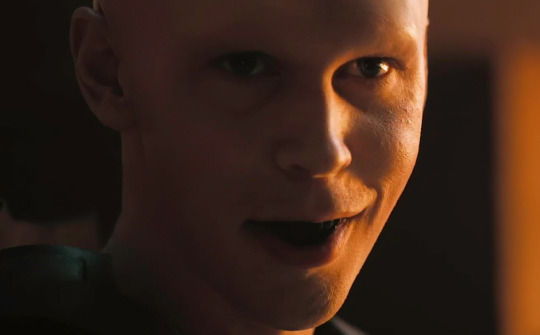
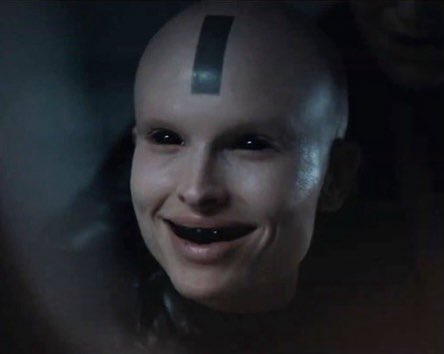
ohaguro, which translates to "black teeth," is a custom born in japan that reached peak popularity between the 10th and 19th centuries (it's first documented in writing in the tale of genji from the 11th century). this practice involved blackening teeth with a solution called kanemizu, which translates to "black water" and consists of iron shavings dissolved in vinegar and then combined with tannins to create a black liquid. the dye was re-applied daily or every other day to avoid the dulling or graying of the color.
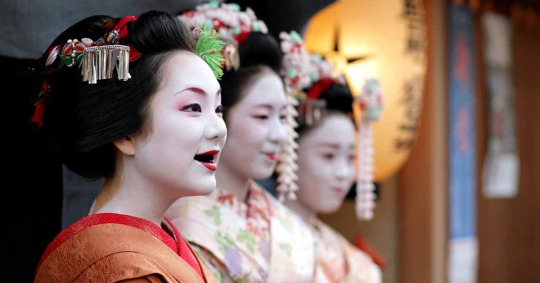
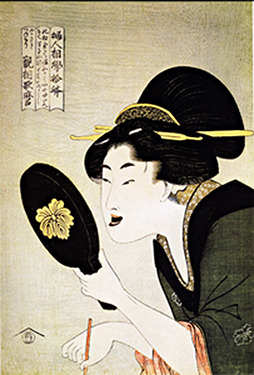
ohaguro was originally practiced exclusively by member of the aristrocracy, mainly by married women, but also some men. ohaguro was commonly practiced when nobility came of age or when women were married. the practice only died out in the 19th century, largely as a result of western beauty ideals being enforced in japanese society through colonialism.
there are a few different reasons why ohaguro was thought to have achieved such popularity within the upper class. deep black was seen as a very beautiful color, and objects that were black were thought to be beautiful. the dye also possibly served to prevent tooth decay.
we see black as a dominant color in various aspects of harkonnen cutlure, including (but not limited) to the armor, ceremonial markings, and clothing of the upper class:
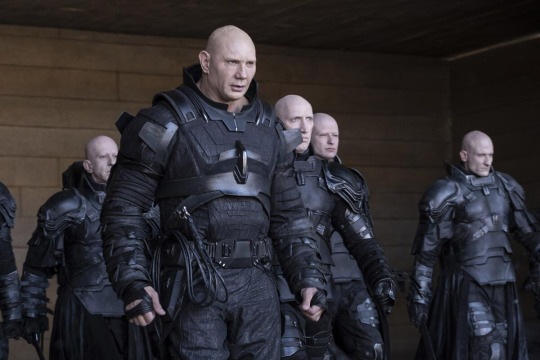
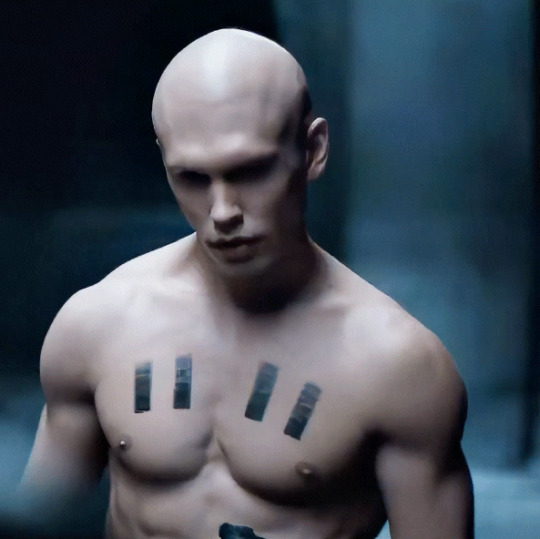
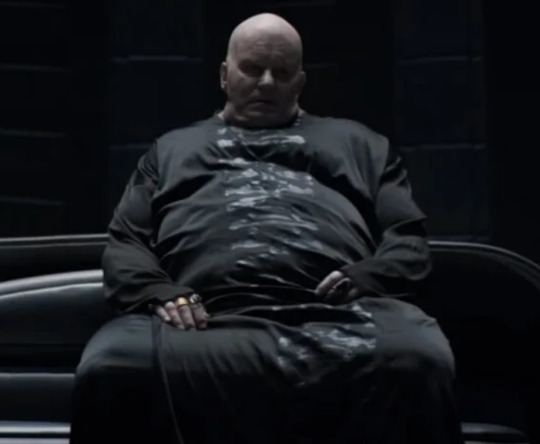
and i think this nudges us further towards this idea of black as a color of beauty, and the idea that teeth blackening was almost like a form of makeup that was seen to make someone more beautiful within upper class social circles.
considering that ohaguro originated with and remained most popular with noble women in japan, it's also very gender that feyd is the only harkonnen man we see with blackened teeth- his uncle the baron and his brother rabban aren't shown with blackened teeth. and the only others we see with blackened teeth are feyd's harpies, who are women.
tldr feyd rautha has black teeth because he's giedi prime's prettiest boy. also he's never beating the femboy allegations like this
#ohaguro#harkonnen culture#house harkonne#harkonnen#meta#dune meta#dune#dune series#dune movie#denis villeneuve#feyd rautha harkonnen#feyd rautha#feyd#glossu rabban#beast rabban#rabban#baron vladimir harkonnen#the baron#vladimir harkonnen#dune part 1#dune 2021#dune part one#dune 1#dune 2#dune 2024#dune part 2#dune part two#dune part ii#dune part i
879 notes
·
View notes
Text
You know fucking tears me me apart about Paul Atreides? From the very beginning, the very fucking start, he's rejecting his destiny. He's terrified of it. He's just a kid and he's completely scared out of his wits, he's warning everyone he trusts that he's the catalyst of a castrophe. He's screaming for help
And nobody listens.
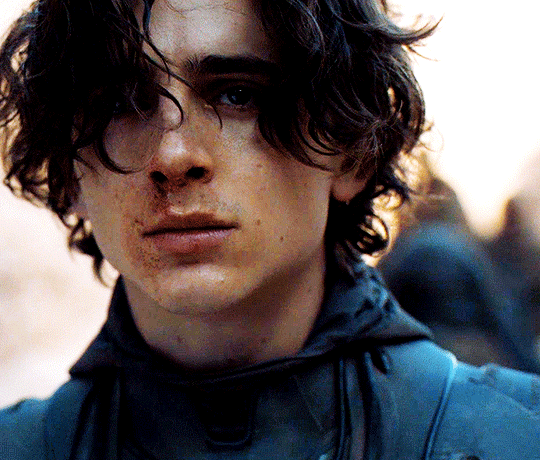
#paul fucking atreides#Paul Atreides deserved better#kwisatz haderach#paul atreides#house atreides#dune#dune 2021#frank herbert#children of dune#dune messiah#chapterhouse: dune#duncan idaho#god emperor of dune#dune 2023#House Harkonnen#House Corrino#dune 1984#Arrakis#shai hulud says live life make spice don't give a fuck#Dune meta
832 notes
·
View notes
Text
If you're one of the people who haven't read the Dune novels or haven't read them since the Villeneuve adaptation brainrot set in, just a couple friendly reminders I haven't seen yet!
The scar on Gurney Halleck's face is from an Inkvine Whip, the same type used by (and possibly the same one as) Glossu Rabban when he was a slave on Giedi Prime.
Despite this killer backstory we don't get Gurney vs. Rabban in the book! Rabban dies offscreen in the battle and both we and Gurney are denied catharsis. Frank loves that.
But almost Not! Because you see, Muad'Dib was in full 'IDGAF about War Crimes' mode at the end of the book, and he'd promised his boy a present of equal or lesser value with the same name. Wrote him a little coupon. 'One Harkonnen to Kill in a Brutal and Humiliating Fashion, exchange for one Nuclear Warhead'
Which leads us to the final scene, where it turns out the only Harkonnen left alive is Feyd-Rautha and Gurney is really eager to remind Paul of what their deal was.
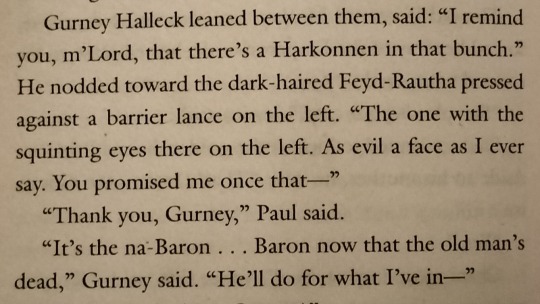
But as we know, Paul is the Duke, the Boy-Messiah, The Emperor to be, and he can absolutely take backsies on promised Good-Boy Points atrocities.
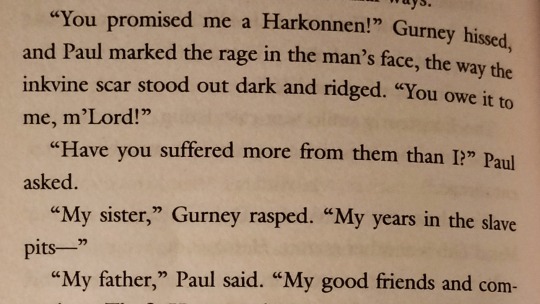
I'm not going to get into all the ways Feyd-Rautha is differently portrayed in the book and movies, but in what is either a 'cowardly move' or the Harkonnen thought process of' 'oh hell no this guy has a serious grudge against my family, I just got free of my uncle for 20 seconds, now I'm about to spend my whole Barony getting tortured-raped to death that ain't how I wanna go out', Feyd-Rautha invokes the ancient vendetta between the Atredies & Harkonnen clans that the Harkonnens put forward a claim to call off (in bad faith but on the record) while Leto on the Record sent back a reply saying 'suck my balls you snakes it's been 10,000 years, it's on sight', which means Paul has to fight him instead in 1:1 combat.
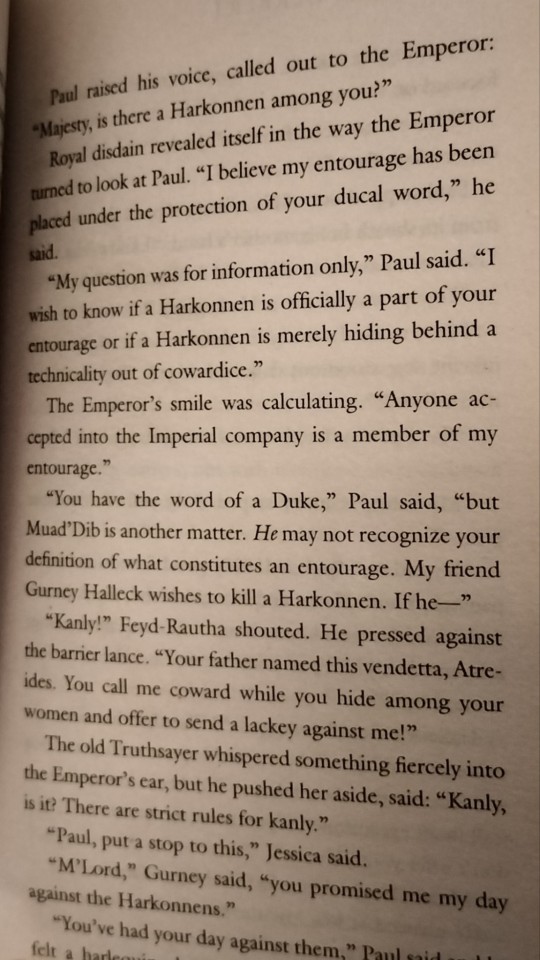
Of course in the Villeneuve adaptation there are many many minor and larger changes that alter Feyd's character for the better, but removing a lot of his more explicit sexual abuse and manipulative pleasing behaviors to survive means we lose a lot of his internal dialogue and his best actions. He is no longer the one to have the slave not be drugged at the fight, he doesn't get to try to kill his uncle with a harem boy that looks just like Paul Atredies and have it backfire miserably. But he does get to stand up and announce himself as the Emperor's champion when he doesn't need to, simply because he wants to and he has things to gain.
It may, with the rewrites, be the only time this version of Feyd-Rautha gets to make a meaningful choice about his destiny.
Plus, Gurney got to kill Rabban, so everyone got something!
#Villeneuve really does love these characters#he wants the best for them but they're all in competition#duneposting#dune meta#feyd rautha#feyd rautha harkonnen#gurney halleck#Feyd-Rautha#dune 2#dune#dune part 2#dune part two
212 notes
·
View notes
